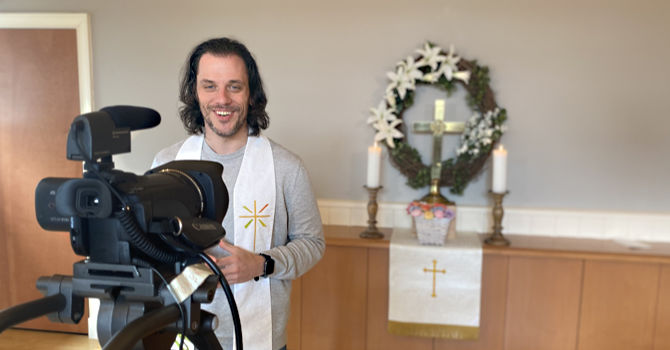I miss our congregation. I miss our life together and our particular embodiment of the church in our little corner of the universe. But the thought of a return to pre-pandemic “life as we knew it” doesn’t hold the same appeal to me as it might have when this began.
At the onset of COVID-19, many congregations -- including mine -- were simply reacting. We were reaching for short-term fixes as our government and medical systems got a handle on things.
But temporary solutions soon became full-fledged adaptations, stretching from weeks into months into seasons. And as we gave ourselves over to our new life together, some beautiful things began to emerge.
We began to get truly creative about worship. We let the Holy Spirit stretch the boundaries of community, drawing in old and new friends, of all physical abilities, from around the country and the world.
We let our imaginations run wild as we devised ways to reach our congregations and communities. Even the much-maligned church meetings took on a whole new spirit with the commute eliminated and gatherings streamlined. While the catalyst of our adaptation was painful, the result was, in moments, crucial.
In the background of all this change in church life was the adaptation in the professional lives of clergy. When the church settled into new rhythms, so did we. As many working professionals have found over the past year, the why of our work didn’t change, but the how, when and where did. Not all of it was easy or welcome, but a lot of it was transformational.
That’s why returning to “life as we knew it” isn’t very appealing to me. To jump back into the rhythms we worked ourselves out of would be to discard the good we’ve found.
Alternatively, clergy and congregations together have a chance to chart a new path forward that both welcomes what we missed and honors what we’ve discovered, if we are brave enough to be honest and curious.
Your pastors may have thrived with the time and space to be creative. Prior to the pandemic, we really didn’t have the time we longed for to do truly creative work. Too many meetings and too many insular issues consumed us. It was so easy to be pulled into the rhythms of business as usual in service of an unnamed “this is how we’ve always done it” ethos. We had little time or space left to help our congregations adapt to a changing world.
The pandemic wiped away those barriers.
Suddenly, the creative urgency of the moment was among the most important pieces of ministry. Unburdened by “business as usual,” our imaginations ran wild with the Holy Spirit. Pastors discovered a new sense of thriving as we re-imagined ancient traditions, leaned into new ideas and reached new audiences.
Your pastors need the chance to be creative, not only for the sake of their imaginations, but also for the sake of the gospel and the mutual thriving of pastor and congregation. It was true before the pandemic, and it will be true after. Any new normal must include a re-imagined prioritization of creativity and innovation.
How can churches and pastors work together to make the necessary changes to prioritize creativity in our schedules?
Your pastors may have loved the permission to innovate and adapt. We know that change is always hard, but before the pandemic, it was especially hard in faith communities. Churches are the places in which we mark life and death, high and low, joy and concern and everything in between. Their rhythms bring us comfort in their familiarity.
Yet change is inevitable. Either we embrace it as an ongoing way of being faithful to God’s promise to “do a new thing” or we wait until it sweeps us up, as it did in the last year.
The urgency of the pandemic freed us collectively from the fear of change. Many of my colleagues and I found our congregations looking to us for adaptation. The moment forced us not only to talk about change but to enact it.
As we imagine the other side of this pandemic, we do not want to lose that zeal for innovation. We must remember how it felt to adapt, pushing through our worry and discovering something beautiful on the other side as we learned to grow, serve, meet and worship in new ways.
How can we hold on to this feeling so that we don’t require another pandemic to drive our innovation?
Your pastors may have cherished the new work-life balance. Those with school-age children at home during this pandemic will attest: in many ways, it has been the toughest season of their lives, balancing work, family and mental health.
Yet there have been some positives for clergy families. The new rhythm to Sunday mornings has allowed more time with loved ones. The reduction in commuting and mandatory meetings have made space for more dinners at home, time on the couch with partners in the evening, beloved bedtime routines.
Some of my colleagues are adamant that these new rhythms have made them better in their ministries. While many clergy would like to put virtual school in the rearview mirror, there are some aspects of parenting and partnering that we should all remember to prioritize as we transition out of this pandemic.
How can our collective life together shift to allow clergy and lay leadership to prioritize these crucial things?
As so many people have suffered in this time, it can feel self-indulgent to reflect on what we’ve gained. For some clergy, this description has not been their experience. But it is the role of the church to model what life together could be for the secular world.
When the world says, “You should just be grateful you have a job,” the church can lean into curiosity and vulnerability, recognizing that we can model what mutual thriving looks like in a world overcome with scarcity.
I’m not looking forward to getting back to “normal.” I’m looking forward to worshipping together, to hugging, laughing, working and serving together. But as we begin to envision the church reunited on the other side of the pandemic, let us do it with honesty, curiosity and bravery.
Pastors must be honest, whatever that might entail. Churches must be curious, not simply assuming that everything will go back to “normal.”
And we must all be brave, willing to have these important conversations. Don’t wait; have them now.














